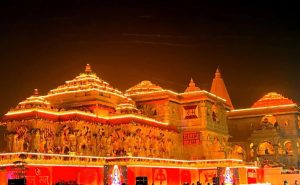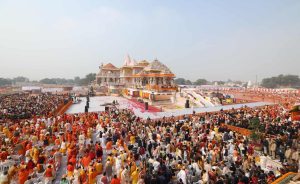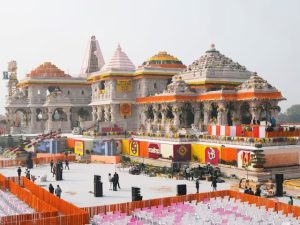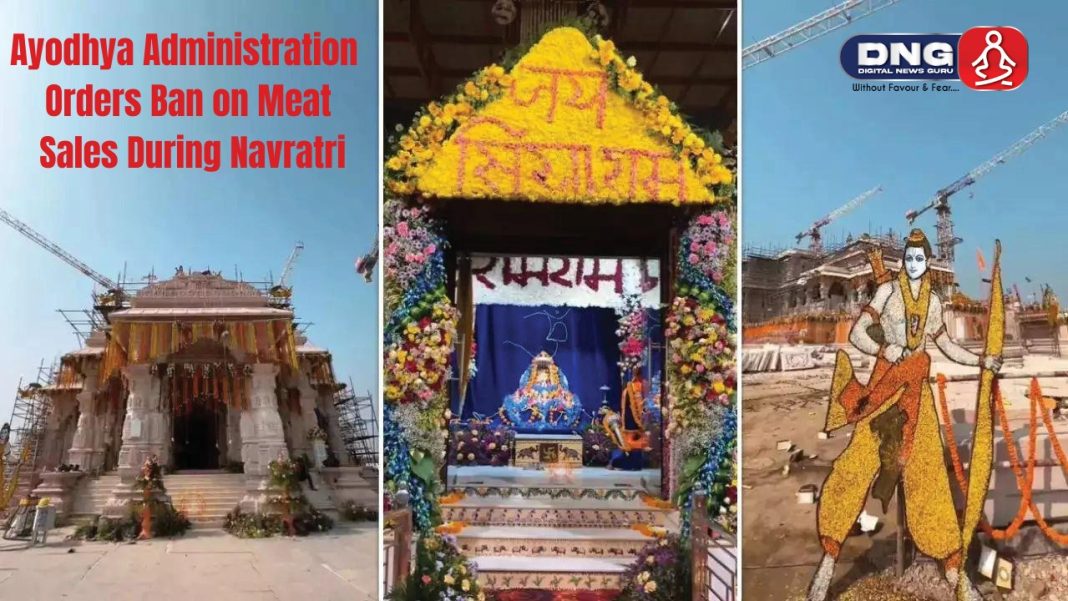DIGITAL NEWS GURU RELIGIOUS DESK:
Ayodhya Administration Orders Ban on Meat Sales During Navratri
In a significant move aimed at maintaining religious sanctity, the Ayodhya administration has imposed a ban on the sale of meat during the Navratri festival, which began on October 3, 2024. This nine-day festival is dedicated to worshipping Goddess Durga and holds immense spiritual importance for Hindus, many of whom observe fasts and follow a strict vegetarian diet during this period.
Ayodhya: A City Steeped in Spiritual Tradition

Ayodhya, revered as the birthplace of Lord Rama, occupies a central place in Hinduism and attracts millions of pilgrims and tourists throughout the year. It is particularly significant during major Hindu festivals such as Ram Navami and Navratri, which are observed with fervor in the city. The ban on meat sales reflects the administration’s efforts to honor the spiritual atmosphere during this important religious period.
Navratri, which means “nine nights,” is dedicated to the worship of various forms of Goddess Durga. Devotees observe fasting, engage in daily prayers, and participate in religious rituals, often abstaining from non-vegetarian food and alcohol to purify the body and mind. The ban imposed by the Ayodhya administration aims to align with these practices and reinforce the city’s role as a center of devotion and worship during Navratri.
Rationale Behind the Ban

By prohibiting the sale of meat, the administration seeks to ensure that the religious practices associated with Navratri can be observed without interference or contradiction.
The decision is also part of a broader effort to enhance Ayodhya’s standing as a global spiritual tourism destination, especially in light of the construction of the Ram Mandir, which is expected to draw millions of pilgrims once completed. With the ongoing transformation of Ayodhya into a hub for Hindu pilgrimage, such measures are becoming increasingly common during religious festivals.
According to the administration, the ban will remain in place for the entire duration of the Navratri festival.
Community Response and Support

The decision to impose a ban on meat sales has been widely supported by the local Hindu community, especially religious leaders and devotees who see it as a necessary step to preserve the sanctity of the festival. Many believe that abstaining from meat and other impure substances is a key part of the spiritual cleansing associated with Navratri, and the administration’s move will help create an atmosphere of purity and devotion.
Local temples and religious organizations have also backed the decision, noting that it reflects the values of restraint, purity, and dedication that are central to the festival. For many devotees, Navratri is not just a time of celebration but also a period of intense spiritual focus, and the ban helps reinforce the importance of these practices.
Concerns from Local Meat Vendors
However, not everyone is pleased with the decision. Meat vendors and restaurant owners who rely on meat sales for their livelihood have expressed concerns about the financial impact of the ban. Many small business owners have pointed out that Navratri is a busy period, and a temporary shutdown could significantly affect their earnings..
Authorities have emphasized that the decision is in the public interest and is essential to maintaining the city’s religious and cultural values during Navratri. They have also encouraged affected vendors to explore alternative sources of income during the festival.
Enforcement and Implementation
To ensure compliance with the ban, the Ayodhya administration has issued strict instructions to law enforcement agencies. Local police have been tasked with monitoring markets, food stalls, and restaurants to ensure that meat is not being sold. Patrols have been increased in key areas of the city, especially near religious sites and temples, to maintain law and order during the festival.
Authorities have assured the public that anyone caught violating the restrictions will face penalties, and efforts will be made to ensure that the ban is enforced smoothly.
A Broader Pattern of Religious Regulation

The ban on meat sales in Ayodhya during Navratri is not an isolated event but part of a broader pattern of religiously motivated regulations in Uttar Pradesh. Under Chief Minister Yogi Adityanath, the state has seen an increase in measures aimed at respecting and promoting Hindu religious practices, particularly in cities with significant cultural or religious importance.
Conclusion
The decision to ban the sale of meat in Ayodhya during Navratri reflects the Uttar Pradesh government’s commitment to preserving the religious and cultural integrity of the city. While the move has been welcomed by many devotees and religious leaders, it has also raised concerns among local business owners who fear the economic impact of the restrictions. Nevertheless, the ban is seen as an important step in maintaining Ayodhya’s status as a global center of Hindu devotion and spirituality, particularly during the ongoing transformation of the city into a major pilgrimage hub.
As Navratri progresses, Ayodhya is set to be a focal point of religious celebrations, with the meat sale ban ensuring that the city’s spiritual atmosphere remains undisturbed during this sacred time.
YOU MAY ALSO READ: 2024 Navratri Celebrations Begin from Today: A Nation Embraces the Festival of Divine Feminine Power








